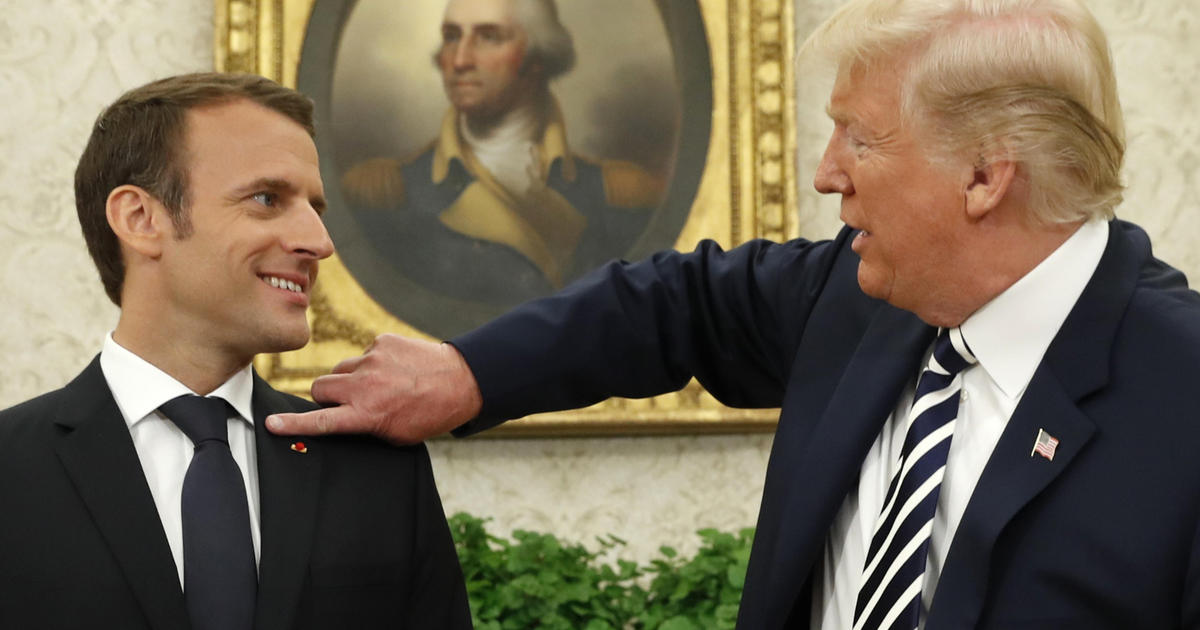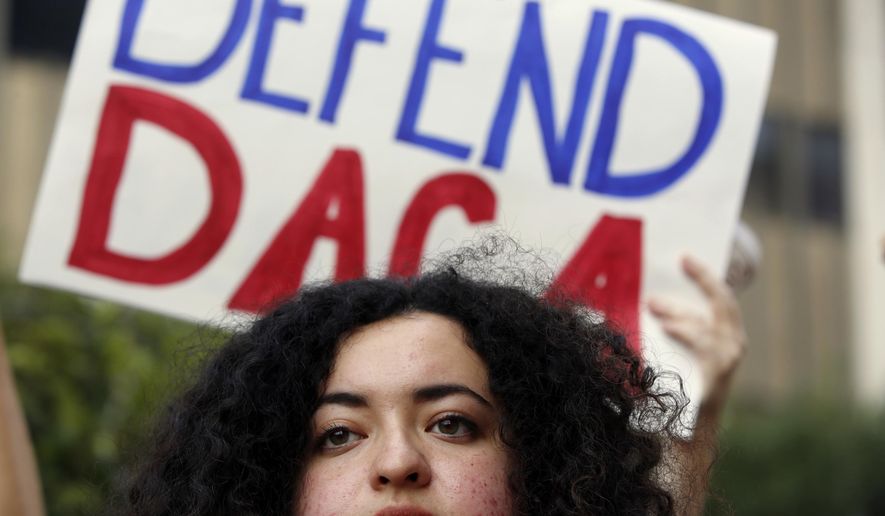Trending 4-25-2018
The French Connection
 Have President Trump and French President Emmanuel Macron worked out a new Iran nuclear deal? After nonstop back patting, hand holding and hugging and dandruff brushing, The President hinted as much during a news conference with Macron.
Have President Trump and French President Emmanuel Macron worked out a new Iran nuclear deal? After nonstop back patting, hand holding and hugging and dandruff brushing, The President hinted as much during a news conference with Macron.
French President Emmanuel Macron and US President Donald Trump have indicated they want to aim for a new deal to curb Iran's regional ambitions and ballistic missiles program that would run alongside the existing international nuclear pact.
Macron, speaking at a joint news conference Tuesday with Trump while on a state visit to Washington, acknowledged a "disagreement" between them on the 2015 Iran deal, which Trump has criticized harshly and repeatedly threatened to ditch.
But, Macron said, "I think we are overcoming it by deciding to work towards a deal, an overall deal that will enable us to deal with the nuclear issue, but also treat it together with another three issues which were not being dealt with so far."
Macron, whose visit to Washington is aimed in part at urging Trump to stick with the 2015 accord, said the Joint Comprehensive Plan of Action (JCPOA) should be seen as the "first pillar" of a broader framework that would also restrict Iran's regional influence, its ballistic missiles and its nuclear activities post-2025, when the existing deal expires.
"I always said we should not tear apart the JCPOA and have nothing else. I think this would not be a good solution," Macron said. "No matter the decision now that President Trump will take, I would like us to work as from now on a new deal with four pillars, including what is already covered by the JCPOA."
Trump -- who opened the day railing against the Obama-era accord as "insane" and "ridiculous"-- has threatened to pull out and reimpose US sanctions on Iran by May 12 unless major changes are made to the agreement, which capped Iran's nuclear program in exchange for relief from economic sanctions.
But he sounded a more conciliatory note as he appeared with Macron, saying: "We can be flexible. You know, in life you have to be flexible, and as leaders of countries, you have to show flexibility."
It remained in question "whether or not it will be possible to do a new deal with solid foundations," Trump said.
"We could have at least an agreement among ourselves fairly quickly," he added. "I think we're fairly close to understanding each other. And I think our meeting, our one-on-one went very, very well."
At the same time, Trump issued an ominous threat should Tehran resume its nuclear program, saying: "If Iran threatens us in any way, they will pay a price like few countries have ever paid." Courtesy of CNN Politics
The Gronk Is Staying
 Rob Gronkowski’s latest social media dispatch is sure to ease the minds of Patriots fans. The All-Pro tight end cleared the air and ended any speculation about his immediate future with an Instagram post-Tuesday afternoon. “I met with coach today and informed him I will be back for the 2018 season with the Pats,’’ Gronkowski wrote. “I have been working out, staying in shape and feel great. Looking forward to another championship run.’’ Gronkowski added #bandsamakeherdance at the end of the post, which also included an old picture of the tight end in uniform showing off his biceps.
Rob Gronkowski’s latest social media dispatch is sure to ease the minds of Patriots fans. The All-Pro tight end cleared the air and ended any speculation about his immediate future with an Instagram post-Tuesday afternoon. “I met with coach today and informed him I will be back for the 2018 season with the Pats,’’ Gronkowski wrote. “I have been working out, staying in shape and feel great. Looking forward to another championship run.’’ Gronkowski added #bandsamakeherdance at the end of the post, which also included an old picture of the tight end in uniform showing off his biceps.
The hashtag is a Juicy J song that Gronkowski has previously referenced on social media. Gronkowski’s agent, Drew Rosenhaus, also was at the meeting and he told ESPN “it was very positive and Rob is committed.’’ ESPN reported Gronkowski will not be traded this season. The timing of Gronkowski’s declaration is important because it gives the team some clarity on the position just two days before the NFL Draft.
It also comes just a day after Tom Brady’s agent, Don Yee, said the quarterback will be back under center as well. Shortly after the tight end’s post, the Patriots tweeted a GIF of Gronkowski celebrating a catch with the caption “mood.’’
Gronkowski had been noncommittal about returning next season ever since the Patriots fell to the Eagles in Super Bowl LII in February. At the time he said he was going to take “the next couple of weeks” to mull his options. Just last weekend, Gronkowski would say only “maybe” when asked if he was coming back. It’s unknown if contract talks were a part of Tuesday’s meeting. Gronkowski has two years left on his current deal that includes a $10.9 million cap hit this season and a $12 million hit in 2019. Gronkowski is coming off a dominant season in which he led the Patriots with 69 receptions for 1,084 yards and 8 touchdowns.
The Patriots have four other tight ends under contract: Dwayne Allen, Jacob Hollister, Troy Niklas, and Will Tye. Courtesy of Boston Globe
DACA Decision
The third federal judge issued the strongest order yet backing DACA. The order gives the administration 90 days to come up with better reasons to scrap DACA or the judge will reinstate it in its entirety.
 A third federal judge on Tuesday ruled against the Trump administration's campaign to end the Deferred Action for Childhood Arrivals program for undocumented immigrants, ordering the administration not only to continue processing applications but also to resume accepting new ones.
A third federal judge on Tuesday ruled against the Trump administration's campaign to end the Deferred Action for Childhood Arrivals program for undocumented immigrants, ordering the administration not only to continue processing applications but also to resume accepting new ones.
U.S. District Judge John Bates of the District of Columbia was withering in his 60-page ruling, calling the administration's attempts to end the program, known as DACA, "arbitrary," "capricious," "virtually unexplained" and "unlawful."
Bates stayed the ruling for 90 days to give the Department of Homeland Security time to come up with better arguments for scrapping the program. If it doesn't, he wrote, he will enter an order reinstating DACA in its entirety.
DACA allows children of illegal immigrants to remain in the United States if they were under 16 when their parents brought them into the country and if they arrived by 2007.
The Trump administration had sought to phase out the program starting last month, but two previous federal rulings stalled its efforts. Neither of those rulings — by judges in New York and San Francisco — ordered the government to resume accepting new applications for protection under DACA, making Bates' ruling the strongest one so far.
"Each day that the agency delays is a day that aliens who might otherwise be eligible for initial grants of DACA benefits are exposed to removal because of an unlawful agency action," Bates wrote. Courtesy of Channel 7 News
Women Staying in the Race Longer than Men
 This year’s Boston Marathon, with its horizontal rain and freezing temperatures, wasn’t just an ordeal unfolding amid some of the worst weather in decades.
This year’s Boston Marathon, with its horizontal rain and freezing temperatures, wasn’t just an ordeal unfolding amid some of the worst weather in decades.
It was also an example of women’s ability to persevere in exceptionally miserable circumstances. In good weather, men typically drop out of this race at lower rates than women do, but this year, women fared better. Why, in these terrible conditions, were women so much better at enduring?
The results for Boston, one of the most competitive marathons in the world, were doleful this year: The winning times for both men and women were the slowest since the 1970s, and the midrace dropout rate was up 50 percent overall from last year.
But finishing rates varied significantly by gender. For men, the dropout rate was up almost 80 percent from 2017; for women, it was up only about 12 percent. Overall, 5 percent of men dropped out, versus just 3.8 percent of women. The trend was true at the elite level, too.
I’ve run the Boston Marathon twice, including in 2013, the year it was bombed. I’m often tempted to drop out of races, but I never actually have. Pushing through affords plenty of time to question the wisdom of prolonging what is sometimes extreme pain. I’m always relieved when I finish — but I never really consider why I bother.
This marathon made me wonder if gender might play a role. You can find a whole range of theories on why women out-endured men in Boston — body fat composition, decision-making tendencies, pain tolerance, even childbirth — but none offers a perfect answer.
One theory is that women handle cold weather better because their bodies naturally have more fat. In general, it’s true that the essential body fat level — one you can’t medically dip beneath — hovers around 3 percent for men and 12 percent for women (when it comes to racing, breasts aren’t exactly performance-enhancing, but they’re still usually part of the deal). And the insulating subcutaneous fat layer under the skin is twice as thick in women as in men.
But at the same race in 2012, on an unusually hot 86-degree day, women also finished at higher rates than men, the only other occasion between 2012 and 2018 when they did. So are women somehow better able to withstand extreme conditions?
That answer could involve psychology. Endurance may feel objective, but your ability to keep going — even if it means slowing down — is often ultimately up to you.
“When you reach the point that you can’t go on, it feels physical, like an immutable limit,” Alex Hutchinson, the author of “Endure,” told me. “But your physical limits are actually mediated by your brain. In most instances, dropping out is a decision.”
The decision process might connect to the perception, or tolerance, of pain. Here’s a potential, if contentious, factor: Childbirth is by most accounts excruciating, and because women’s athletic and fertility peaks are close or overlap, a lot of the female marathoners who race Boston have also given birth. Courtesy of the NYTimes






